-
ORIGINAL ARTICLE10-17-2022
Coping with the health condition from the perspective of people with HIV who abandoned treatment
Revista Brasileira de Enfermagem. 2022;75:e20210958
Abstract
ORIGINAL ARTICLECoping with the health condition from the perspective of people with HIV who abandoned treatment
Revista Brasileira de Enfermagem. 2022;75:e20210958
DOI 10.1590/0034-7167-2021-0958
Views0See moreABSTRACT
Objectives:
to understand how people living with HIV who have abandoned treatment face their health condition.
Methods:
a qualitative study, based on the Chronic Care Model theoretical precepts. Data were collected between April and August 2021, through interviews with 24 people registered in a specialized service in the Brazilian Midwest.
Results:
coping with the health condition included good and bad moments and is influenced by individual behaviors and the way in which the network was organized. Treatment abandonment was motivated by the absence of signs and symptoms, the way care is provided and medication side effects.
Final Considerations:
care actions focusing on behavior change and maintenance become necessary in order to favor continuity of treatment. Furthermore, the gaps identified in the way health services are organized are subject to intervention.
-
ORIGINAL ARTICLE10-07-2022
Construction and validation of a serial album for companions of patients with stroke
Revista Brasileira de Enfermagem. 2022;75(4):e20210843
Abstract
ORIGINAL ARTICLEConstruction and validation of a serial album for companions of patients with stroke
Revista Brasileira de Enfermagem. 2022;75(4):e20210843
DOI 10.1590/0034-7167-2021-0843
Views0See moreABSTRACT
Objectives:
to construct and validate a serial album, to be used in hospital discharge planning of patients with stroke.
Methods:
a methodological study, with construction of a serial album, validity by 22 judges and assessment by 22 companions. Data were collected from the Health Education Content Validity Instrument, with the companions, from the Suitability Assessment of Materials.
Results:
the serial album has 21 pages. The overall Content Validity Index was equal to 0.87 among expert judges and 1.0 among companions.
Conclusions:
the educational technology constructed was considered valid by the judges and assessed as understandable by the companions so that it presented itself as a viable technological resource for use in the health education of companions of patients with stroke.
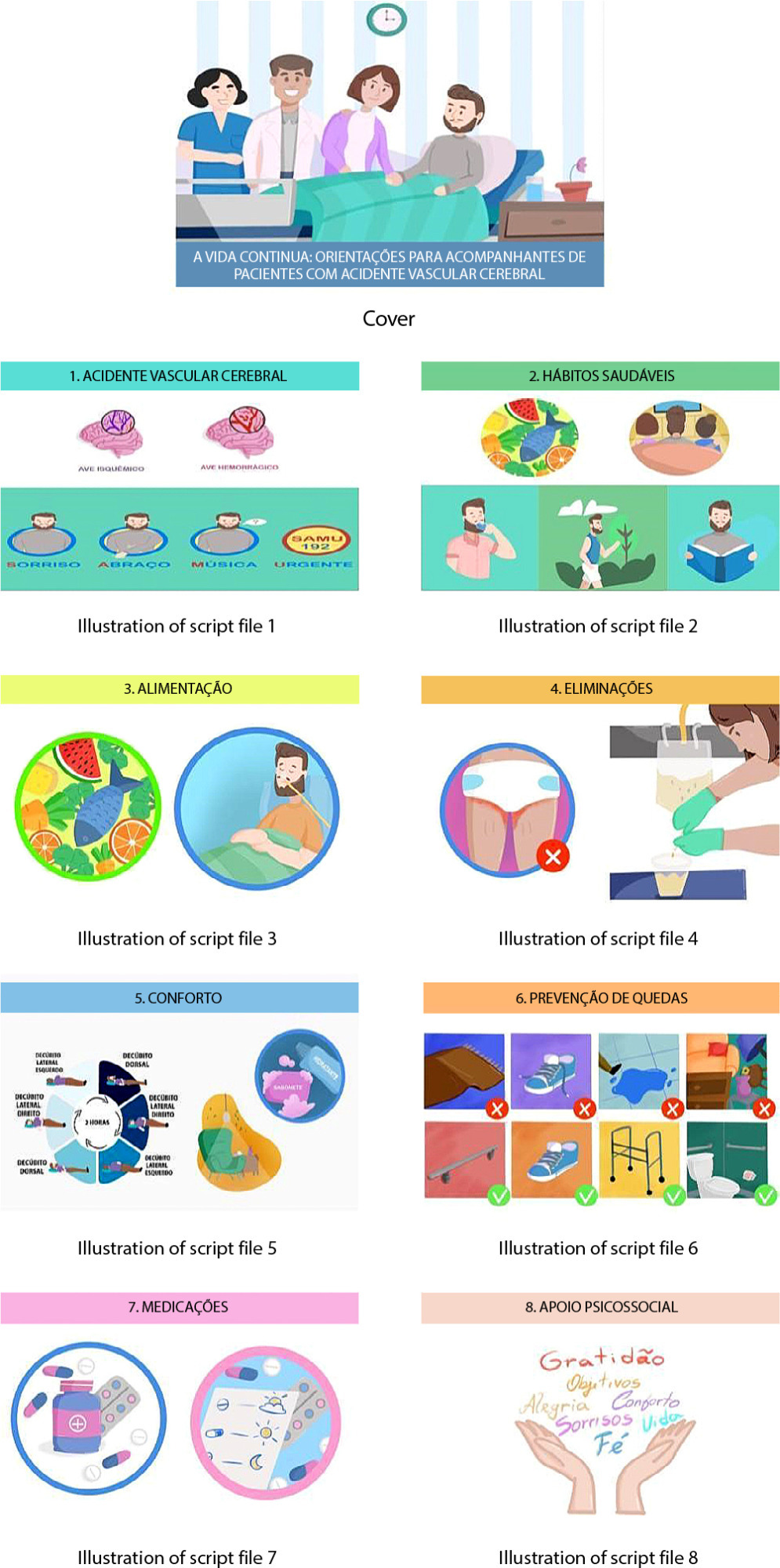
-
REVIEW10-07-2022
Strategies for thirst management in postoperative adult patients: a scoping review
Revista Brasileira de Enfermagem. 2022;75(4):e20220154
Abstract
REVIEWStrategies for thirst management in postoperative adult patients: a scoping review
Revista Brasileira de Enfermagem. 2022;75(4):e20220154
DOI 10.1590/0034-7167-2022-0154
Views0See moreABSTRACT
Objectives:
to map the strategies for managing thirst in postoperative adult patients.
Methods:
scoping review was conducted in October 2021 in 19 data sources: 14 databases and 5 platforms to search in the grey literature. It was prepared according to the recommendations of the Joanna Briggs Institute and the checklist of the Preferred Reporting Items for Systematic reviews and Meta-Analyses extension for Scoping Reviews. Nine selected articles were part of the final sample.
Results:
there is evidence of strategies to manage postoperative thirst using interventions such as water, ice, mentholated measures, carbohydrate and protein enriched fluid, oral hydrator, flavored gargling, cold gargling, wet gauze, 0.75% citric acid spray, and cold water.
Final Considerations:
the strategies observed may be reduced to cold and menthol use, salivary stimulants, and early introduction of fluids. The outcomes were positive in all the studies reviewed.
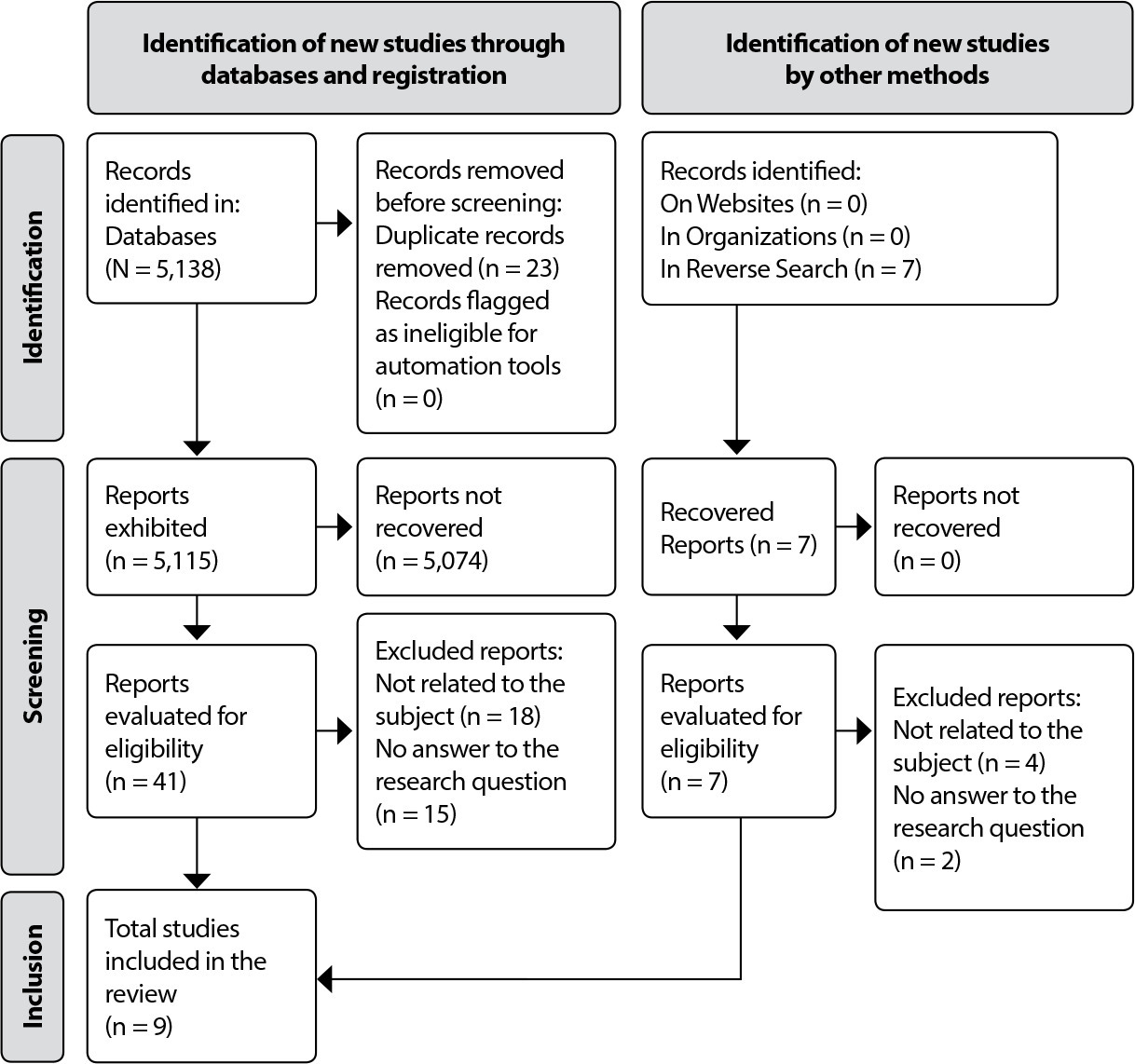
-
ORIGINAL ARTICLE10-07-2022
Perception of men perpetrators of violence about paternity
Revista Brasileira de Enfermagem. 2022;75(4):e20210890
Abstract
ORIGINAL ARTICLEPerception of men perpetrators of violence about paternity
Revista Brasileira de Enfermagem. 2022;75(4):e20210890
DOI 10.1590/0034-7167-2021-0890
Views0See moreABSTRACT
Objectives:
to learn about the perception of men in the judicial process due to spousal violence about paternity.
Methods:
a descriptive, qualitative study with nine men in the judicial process due to spousal violence. Data were collected through interviews; the men validated the data, which were systematized by the categorical thematic content analysis, and analyzed in light of scientific texts that discuss the subject.
Results:
the study allowed the creation of three categories: the father is the example for the son; the father must provide for the son’s needs; the father corrects the son.
Conclusions:
that context reveals the need to re-signify paternity to influence children’s education positively.
-
ORIGINAL ARTICLE10-07-2022
Nursing workload associated with neonatal mortality risk: a cross-sectional study
Revista Brasileira de Enfermagem. 2022;75(4):e20200965
Abstract
ORIGINAL ARTICLENursing workload associated with neonatal mortality risk: a cross-sectional study
Revista Brasileira de Enfermagem. 2022;75(4):e20200965
DOI 10.1590/0034-7167-2020-0965
Views0See moreABSTRACT
Objectives:
to analyze the association between nursing workload and neonatal mortality risk in newborns admitted to the Neonatal Intensive Care Unit.
Methods:
this is an observational, cross-sectional study conducted from January 2019 to January 2020.
Results:
the sample consisted of 399 newborns, 55.4% male, Nursing Activities Score mean of 67.5%, and Score for Neonatal Acute Physiology Perinatal Extension mean of 17.7, revealed itself as a predictor of the risk of death, while gestational age, length of hospitalization, and the first-minute Apgar established a protective relationship. The correlation between workload and neonatal mortality was low (r= 0.23, p=0.0009).
Conclusions:
the workload of the nursing team is not associated with the risk of mortality in the Neonatal Intensive Care Unit, as measured by the Nursing Activities Score.
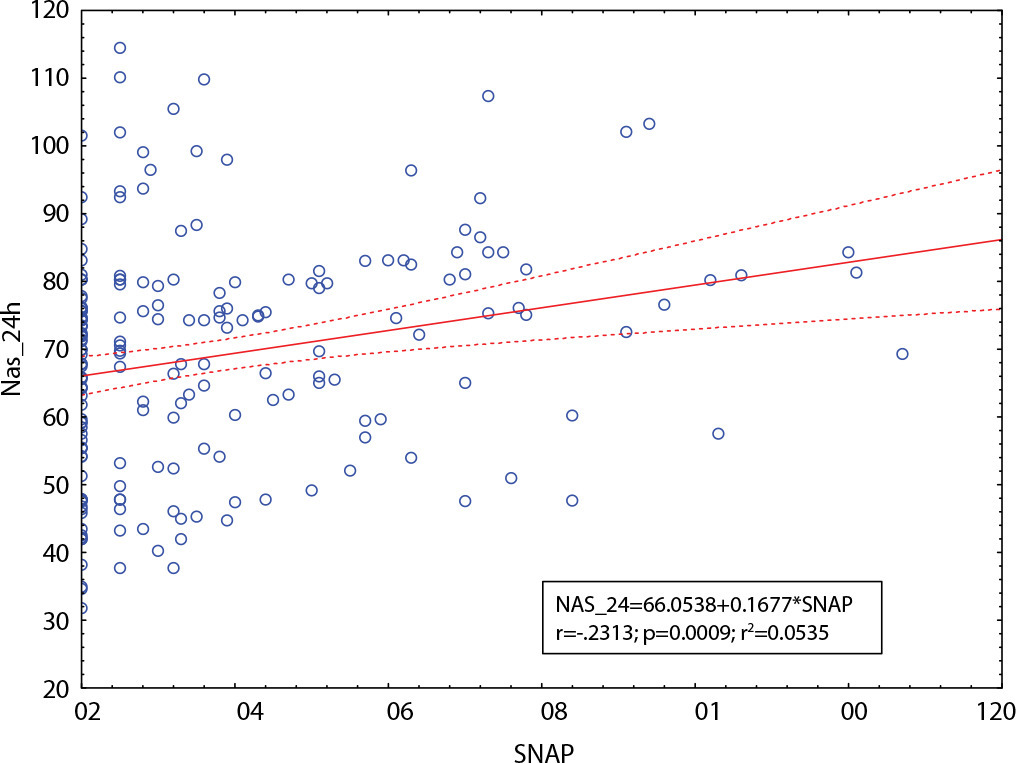
-
ORIGINAL ARTICLE10-07-2022
Violence against nursing workers: repercussions on patient access and safety
Revista Brasileira de Enfermagem. 2022;75(4):e20210765
Abstract
ORIGINAL ARTICLEViolence against nursing workers: repercussions on patient access and safety
Revista Brasileira de Enfermagem. 2022;75(4):e20210765
DOI 10.1590/0034-7167-2021-0765
Views1See moreABSTRACT
Objectives:
to analyze the repercussions of violence against nursing professionals, in the access and safety of patients in Family Health Strategy.
Methods:
a mixed study, with 169 nursing professionals. We used a socio-labor questionnaire, Survey Questionnaire Workplace Violence in the Health Sector, a patient safety instrument and interviews.
Results:
verbal aggression was related to support (p=0.048), respect (p=0.021), hours of care (p=0.047) and patient safety behaviors (p=0.033) among professionals. Suffering from bullying was related to fear of questioning when something is wrong (p=0.010) and lack of support from management (p=0.016). Victims of physical violence felt that their mistakes could be used against them. Mixed data converge and confirm that violence affects professional behavior and puts Primary Health Care attributes at risk.
Conclusions:
violence affects workers’ behavior, interferes with the care provided, weakens the access and safety of patients.
-
REVIEW10-03-2022
Intravenous therapy device labeling in Intensive Care Units: an integrative review
Revista Brasileira de Enfermagem. 2022;75(6):e20220049
Abstract
REVIEWIntravenous therapy device labeling in Intensive Care Units: an integrative review
Revista Brasileira de Enfermagem. 2022;75(6):e20220049
DOI 10.1590/0034-7167-2022-0049
Views0See moreABSTRACT
Objectives:
to synthesize the evidence on intravenous device labeling used to identify medications administered to patients in Intensive Care Units, with a view to preventing medication errors.
Methods:
an integrative review, in the LILACS, IBECS, Embase, MEDLINE, Scopus, Web of Science and CINAHL databases, from November to December 2021, using descriptors and selection criteria. Data were collected in 11 articles and subsequently classified, summarized and aggregated.
Results:
pre-designed labels, with pre-defined colors and information, help to prevent medication identification errors. There is still a lack of standardization in the practice of labeling syringes, intravenous lines, infusion pumps and saline solution bags. There are errors related to the lack of labeling devices or to their performance with incomplete information.
Conclusions:
device labeling is a barrier to defending the medication system safety and should be standardized.
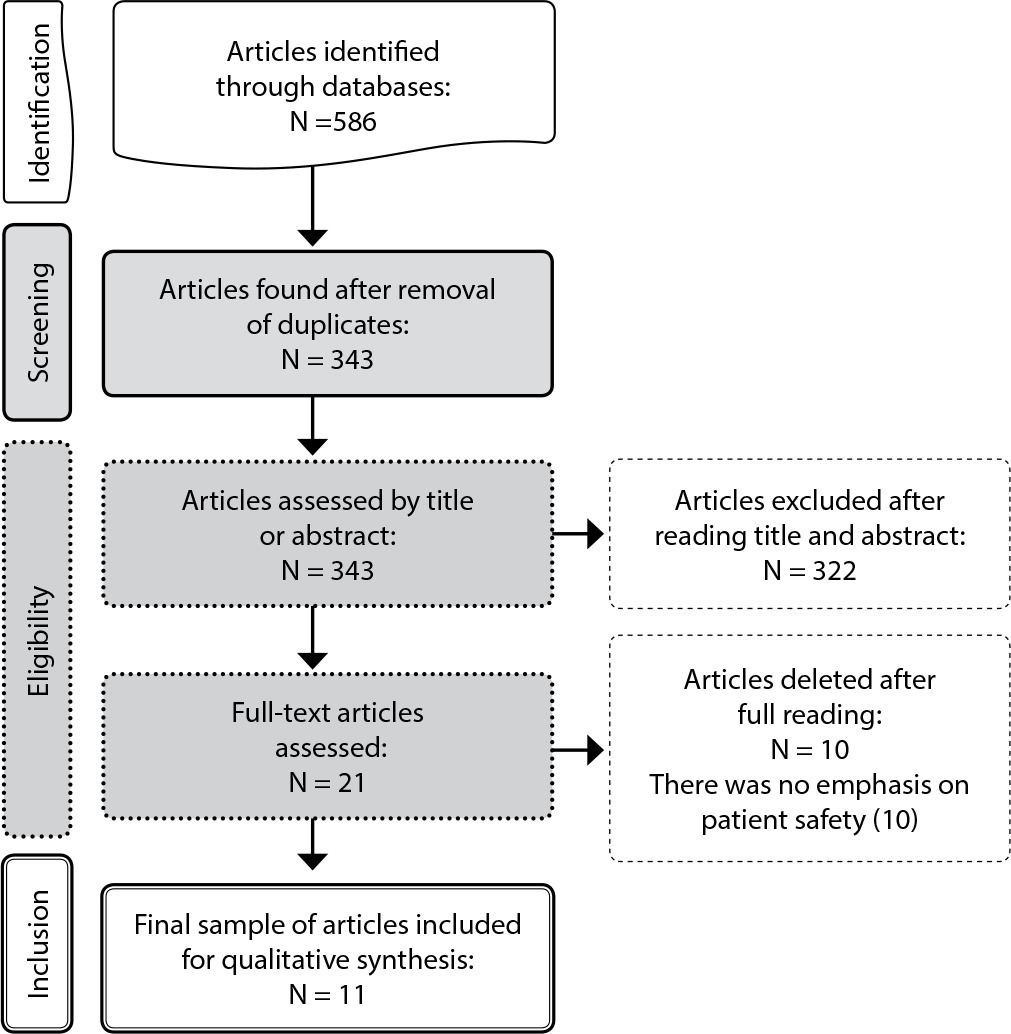
-
ORIGINAL ARTICLE10-03-2022
Evaluation of respiratory complications in a cohort of preterm infants who did not receive palivizumab monoclonal antibodies
Revista Brasileira de Enfermagem. 2022;75(6):e20210362
Abstract
ORIGINAL ARTICLEEvaluation of respiratory complications in a cohort of preterm infants who did not receive palivizumab monoclonal antibodies
Revista Brasileira de Enfermagem. 2022;75(6):e20210362
DOI 10.1590/0034-7167-2021-0362
Views0See moreABSTRACT
Objectives:
to analyze the occurrence of respiratory complications over the first year of life in preterm infants who did not receive palivizumab monoclonal antibodies.
Methods:
analytical retrospective cohort study with preterm infants born between 2012 and 2016 in Uberlândia, state of Minas Gerais, Brazil. Data collection occurred from January to November 2018, by consulting hospital and primary healthcare medical records. Data were processed with the Poisson regression model, with p<0.05.
Results:
of a total of 5,213 preterm births, 504 (9.7%) met the inclusion criteria. The preterm infants in this subset were assisted 2,899 times in primary care, which resulted in 1,098 (37.5%) medical diagnoses, of which 803 (78.5%) involved the respiratory tract. Preterm babies fed on formula milk at hospital discharge had more diagnoses of respiratory diseases. Maternal age (p=0.039), respiratory diagnosis at hospital discharge (p=0.028), and number of sporadic appointments (p<0.001) showed a significant association with bronchiolitis; number of sporadic appointments showed a significant association with occurrence of respiratory diseases; and breastfeeding had a protective effect against the development of bronchiolitis.
Conclusions:
preterm infants who did not receive palivizumab showed a high percentage of respiratory diseases, and breastfeeding helped protect them against bronchiolitis. It is recommended that these preterm babies be monitored in primary health care.
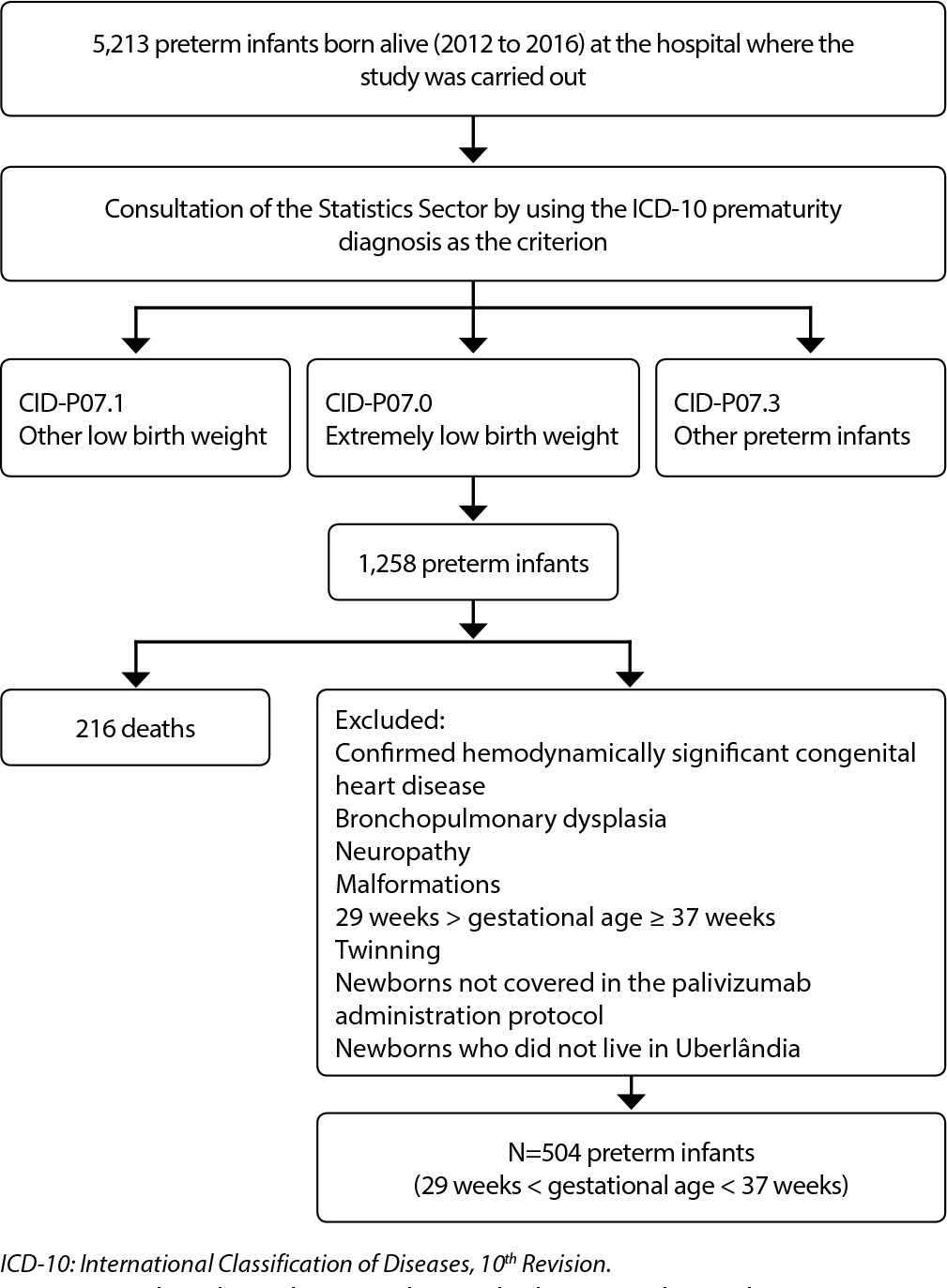
-
REVIEW01-01-2018
Coping strategies for domestic violence against pregnant female adolescents: integrative review
Revista Brasileira de Enfermagem. 2018;71:693-699
Abstract
REVIEWCoping strategies for domestic violence against pregnant female adolescents: integrative review
Revista Brasileira de Enfermagem. 2018;71:693-699
DOI 10.1590/0034-7167-2017-0682
Views0See moreABSTRACT
Objective:
To investigate and analyze in the scientific literature coping strategies for domestic violence against pregnant female adolescents.
Method:
This is an integrative literature review, conducted from July to August 2017 on LILACS, SciELO and PubMed, using the descriptors and the MeSH terms: confrontation, violence, adolescent, pregnant women, prenatal care.
Result:
The sample comprised 9 articles that were organized and characterized according to year, country of study and coping strategy used. The main forms of coping involved the active search for cases and the primary care approach with all family members.
Conclusion:
Individualized prenatal care, the change in professional training and networking activities were pointed out as important components of the strategies for coping with violence against pregnant adolescents.

-
RESEARCH01-01-2018
Repercussions of hospitalization due to fall of the elderly: health care and prevention
Revista Brasileira de Enfermagem. 2018;71:763-769
Abstract
RESEARCHRepercussions of hospitalization due to fall of the elderly: health care and prevention
Revista Brasileira de Enfermagem. 2018;71:763-769
DOI 10.1590/0034-7167-2017-0069
Views0See moreABSTRACT
Objective:
To know the repercussions of the fall reported by the elderly and their caregiver during hospitalization in a public hospital in Florianópolis city from October to December 2014.
Method:
Exploratory research with a qualitative approach, conducted by depth interviews with 16 participants, the eight elderly were hospitalized for falls and eight elderly caregivers. Data analysis were performed through the Thematic Content Analysis.
Results:
It was evidenced the thematic axis: Faller Elderly supported by four thematic categories: Changes caused by Falls, I am a faller, I take care of me and Prevention of the Fall. The repercussions of the fall were evidenced in the impairment of the health condition, self-care and functional capacity. We observed the naturalization of the phenomenon and the passivity with the harmful consequences of the event.
Final Considerations:
The fall is valued the more negative its repercussion, such as the need for hospitalization and surgery. Managing the vulnerability of the elderly, especially in primary care, evaluating their comorbidities and their internal and external environment, will minimize unfavorable consequences and the social and financial cost of hospitalizations.
-
RESEARCH01-01-2018
The adolescent and the institutionalization: understanding the phenomenon and meanings attributed to it
Revista Brasileira de Enfermagem. 2018;71:1373-1380
Abstract
RESEARCHThe adolescent and the institutionalization: understanding the phenomenon and meanings attributed to it
Revista Brasileira de Enfermagem. 2018;71:1373-1380
DOI 10.1590/0034-7167-2017-0242
Views1See moreABSTRACT
Objective:
To understand the meaning of being institutionalized and in conflict with the law for the institutionalized adolescent.
Method:
A qualitative, phenomenological-comprehensive study carried out in a Socio-educational Service Foundation in the northern region of Brazil, with 05 institutionalized adolescents. The analysis was carried out under the understanding of the content suggested by Heidgger, thus allowing the construction of analytical categories for a hermeneutical interpretation.
Results:
Conflicting with the law means something negative and bad for the institutionalized adolescents, in which they understand that although there is deprivation of liberty, the period of hospitalization is an important moment for the reflection on the need to start over.
Conclusion:
The meaning of conflicting with the law goes far beyond a simple word, act or behaviour, it is something that only those who experience the phenomenon are able to unveil, arouse deep feelings and provide reflection to the adolescent about the damages caused by the infraction.
-
RESEARCH01-01-2018
Identification of post-cesarean surgical site infection: nursing consultation
Revista Brasileira de Enfermagem. 2018;71:1395-1403
Abstract
RESEARCHIdentification of post-cesarean surgical site infection: nursing consultation
Revista Brasileira de Enfermagem. 2018;71:1395-1403
DOI 10.1590/0034-7167-2017-0325
Views0See moreABSTRACT
Objective:
To describe the profile of women in relation to their living conditions, health status and socio-demographic profile, correlating it with the presence of signs and symptoms suggestive of post-cesarean surgical site infection, identifying information to be considered in the puerperium consultation performed by nurses and proposing a roadmap for the systematization of care.
Method:
Quantitative, exploratory, descriptive, cross-sectional and retrospective review of medical records of women who had cesarean deliveries in 2014, in the city of São Paulo.
Results:
89 medical records were analyzed, 62 of them with incomplete information. In 11, there was at least one of the signs and symptoms suggestive of infection.
Conclusion:
Given the results of the study, the systematization of puerperal consultation is essential. The roadmap is an instrument that can potentially improve the quality of service and the recording of information.
-
RESEARCH01-01-2018
Nursing laboratory and critical education of nurses: approaches and distances
Revista Brasileira de Enfermagem. 2018;71:1500-1506
Abstract
RESEARCHNursing laboratory and critical education of nurses: approaches and distances
Revista Brasileira de Enfermagem. 2018;71:1500-1506
DOI 10.1590/0034-7167-2017-0339
Views1See moreABSTRACT
Objective:
to analyze the contribution of the laboratory of nursing to the critical education of nurses.
Method:
qualitative study, conducted among 18 professors of higher education institutions, being one public and the other private. Data were collected between February and November of 2016 by means of semi-structured interview. To analyze data, it was used a content analysis in the thematic modality.
Results:
it was observed the emphasis in the technical skills development by propagation of behavior and practices; the creation of bonds between professors and students happens on the limit of good interpersonal relationship; the laboratory of nursing may help the critical reflection about the practice, being a place that allows the learning of ethics.
Final considerations:
the nurse education, carried out by the laboratory of nursing, have to overcome the emphasis in the uncritical reproduction of practices and to observe the nurse’s power to think about the reality in the meaning of its modification.
-
RESEARCH01-01-2018
Introduction of the School Health Program in the city of Cascavel, Paraná State: report of nurses
Revista Brasileira de Enfermagem. 2018;71:1540-1547
Abstract
RESEARCHIntroduction of the School Health Program in the city of Cascavel, Paraná State: report of nurses
Revista Brasileira de Enfermagem. 2018;71:1540-1547
DOI 10.1590/0034-7167-2017-0188
Views1See moreABSTRACT
Objective:
to understand the introduction of the School Health Program in the city of Cascavel, Paraná State, as opposed to the report of nurses.
Method:
a qualitative study with fifteen participants. The data were collected from April to August 2015, through semi-structured interviews, analyzed by content analysis and thematic modality.
Results:
the category “Introduction process” of the School Health Program integrates the subcategories “Identified health problems” and the “Challenges of intersectoriality”. The program was implemented quickly, with a fragile training of professionals to perform in the phases that compose it. Structural conditions of schools, human and material resources, and emerging intersectoral interaction were identified obstacles. The integration of the health, school, and family constitutes the program’s potentiality.
Final considerations:
it is understood that the actions of the program were based on health assessments of students, and it is necessary for professionals and managers to discuss and analyze the obstacles identified to achieve all the proposed objectives.
-
RESEARCH01-01-2018
Knowledge about precautions in Primary Health Care: tool validation
Revista Brasileira de Enfermagem. 2018;71:1589-1595
Abstract
RESEARCHKnowledge about precautions in Primary Health Care: tool validation
Revista Brasileira de Enfermagem. 2018;71:1589-1595
DOI 10.1590/0034-7167-2017-0886
Views0See moreABSTRACT
Objective:
To elaborate and validate a tool to assess knowledge and behavior of nursing professionals about standards and specific precautions in the Primary Health Care.
Method:
Methodological study of the elaboration and validation of the tool by thirteen experts judges, using a Likert scale of 4 points, with Content Validity Index ≥ 0.80, on clarity, relevance and pertinence.
Results:
A tool composed of 47 dichotomous questions to assess knowledge and 12 questions, with five options of answers, for the referred behavior. In the validation, only one item was deleted, related to the “Hands Hygiene” axis and one item was reformulated, regarding “Use of Common Gloves” and another 11 changed writing. The tool as a whole was assessed for relevance, comprehensiveness and representativeness within the scope of the topic investigated.
Conclusion:
The developed tool has been validated and is now available for use in Primary Health Care.
-
RESEARCH01-01-2018
Training in diabetes education: meanings attributed by primary care nurses
Revista Brasileira de Enfermagem. 2018;71:1611-1618
Abstract
RESEARCHTraining in diabetes education: meanings attributed by primary care nurses
Revista Brasileira de Enfermagem. 2018;71:1611-1618
DOI 10.1590/0034-7167-2017-0792
Views1See moreABSTRACT
Objective:
seize meanings attributed by primary care nurses to training in diabetes education.
Method:
exploratory and descriptive study, with a qualitative approach, with twenty primary care nurses; semistructured interview script, with interviews processed in the IRaMuTeQ software and analyzed through the Descending Hierarchical Classification. The results were subsidized in the Representational Theory of Meaning.
Results:
nurse training in diabetes education is insufficient for holistic action, although it allows the community to be instrumentalized in specific issues about the disease, using the limited tools available, especially lectures. Nurses find themselves in a context of challenges, improvisations, weaknesses, and limitations that determine the meaning attributed to diabetes education and subsequent actions.
Conclusion:
the meanings attributed by the nurses revealed an incipient training, which limits the quality of care provided and instigates the search for qualification.

-
ORIGINAL ARTICLE04-09-2020
High-risk areas of leprosy in Brazil between 2001-2015
Revista Brasileira de Enfermagem. 2020;73(3):e20180583
Abstract
ORIGINAL ARTICLEHigh-risk areas of leprosy in Brazil between 2001-2015
Revista Brasileira de Enfermagem. 2020;73(3):e20180583
DOI 10.1590/0034-7167-2018-0583
Views0See moreABSTRACT
Objectives:
to identify high-risk areas of leprosy in Brazil from 2001 to 2015.
Methods:
this is an ecological study of spatial analysis based on Brazilian municipalities. Spatial scan statistics were used to identify spatial clustering and measure the relative risk from the annual detection rate of new cases of leprosy. By criterion based on the Gini index, only secondary clusters were considered.
Results:
spatial scan statistics detected 26 clusters, in which the detection rate was 59.19 cases per 100 thousand inhabitants, while in the remainder of the country it was 11.76. Large part of the cluster area is located in the Legal Amazon. These groups included only 21.34% of the total population, but 60.40% of the new cases of the disease.
Conclusions:
Leprosy remains concentrated in some areas, showing the need for control programs to intensify actions in these municipalities.

-
REVIEW04-16-2021
Clinical outcomes of patient navigation performed by nurses in the oncology setting: an integrative review
Revista Brasileira de Enfermagem. 2021;74(2):e20190804
Abstract
REVIEWClinical outcomes of patient navigation performed by nurses in the oncology setting: an integrative review
Revista Brasileira de Enfermagem. 2021;74(2):e20190804
DOI 10.1590/0034-7167-2019-0804
Views0See moreABSTRACT
Objective:
to evidence the clinical outcomes of navigation performed by nurses in cancer patients.
Methods:
this is an integrative literature review with collection in MEDLINE via PUBMED, LILACS, Web of Science, Scopus, and CINAHL databases. The final sample consisted of seven studies. The data were analyzed and presented descriptively. Data related to clinical outcomes were compiled and described in full. The Agency for Healthcare Research and Quality categorization was used to assess the level of evidence.
Results:
the clinical outcomes demonstrated were decreased distress, anxiety and depression, improved control and management of symptoms, improved physical conditioning, improved quality and continuity of care, improved quality of life, reduced time to start treatment.
Final considerations:
there is research that shows better clinical outcomes in cancer patients through navigation by nurses across the continuum of health care.

-
ORIGINAL ARTICLE12-13-2019
Perceptions and expectations of pregnant women about the type of birth
Revista Brasileira de Enfermagem. 2019;72:41-49
Abstract
ORIGINAL ARTICLEPerceptions and expectations of pregnant women about the type of birth
Revista Brasileira de Enfermagem. 2019;72:41-49
DOI 10.1590/0034-7167-2017-0731
Views0See moreABSTRACT
Objective:
to understand the perceptions and expectations of pregnant women about the type of birth.
Method:
this is a qualitative research, based on the assumptions of the Humanization of Obstetric Care. 15 pregnant women were interviewed twice at the beginning and the end of gestation between October 2015 and May 2016. Data were analyzed according to the method of the Discourse of the Collective Subject.
Results:
the discourses were associated with four themes: Advantages of vaginal birth over cesarean section; Fear and unpredictability of vaginal birth; Importance of the doctor in the definition of the type of birth; and Influence of family and friends in choosing the type of birth.
Final considerations:
according to pregnant women, vaginal birth has more benefit compared to cesarean section. However, during gestation and birth, fear of pain and the unexpected, and medical opinions of friends and family against vaginal birth strongly influence the choice of cesarean section.
-
REVIEW09-30-2020
Telenursing in care, education and management in Latin America and the Caribbean: an integrative review
Revista Brasileira de Enfermagem. 2020;73:e20190317
Abstract
REVIEWTelenursing in care, education and management in Latin America and the Caribbean: an integrative review
Revista Brasileira de Enfermagem. 2020;73:e20190317
DOI 10.1590/0034-7167-2019-0317
Views0See moreABSTRACT
Objective:
Analyze the knowledge generated about telenursing related to the roles of nurses (care, education and management) in Latin America and the Caribbean, based on scientific evidence.
Methods:
Integrative review, for the years 2009 to 2019, in scientific databases from Latin America and the Caribbean. Twelve articles were selected.
Results:
Nine studies focused on care and three on education. The information and communication technology used in the studies was telephony directed toward non-communicable diseases. There were concerns about the remote communication process. With respect to education, two focused on educating health teams and one on educating patients.
Conclusion:
It is necessary to conduct studies on telenursing that generate changes in care practices, explore information and communication technology resources and provide communication training focused on this new care model.

-
REVIEW08-14-2020
Nursing practice environment in Primary Health Care: a scoping review
Revista Brasileira de Enfermagem. 2020;73(6):e20190479
Abstract
REVIEWNursing practice environment in Primary Health Care: a scoping review
Revista Brasileira de Enfermagem. 2020;73(6):e20190479
DOI 10.1590/0034-7167-2019-0479
Views0INTRODUCTIONKnowledge and scientific evidence about nursing practice environments (NPE) in the context of Primary Health Care (PHC) is scarce.Policy makers, health and professional organizations have proposed to redesign the health system in PHC with the aim of increasing citizens’ accessibility, improving customer outcomes and maximizing efficiency. […]See more
-
ORIGINAL ARTICLE08-19-2019
Interruptions and nursing workload during medication administration process
Revista Brasileira de Enfermagem. 2019;72(4):1001-1006
Abstract
ORIGINAL ARTICLEInterruptions and nursing workload during medication administration process
Revista Brasileira de Enfermagem. 2019;72(4):1001-1006
DOI 10.1590/0034-7167-2018-0680
Views0See moreABSTRACT
Objective:
To investigate the sources and causes of interruptions during the medication administration process performed by a nursing team and measure its frequency, duration and impact on the team’s workload.
Métodos:
This is an observational study that timed 121 medication rounds (preparation, administration and documentation) performed by 15 nurses and nine nursing technicians in a Neonatal Intensive Care Unit in the countryside of the state of São Paulo.
Resultados:
63 (52.1%) interruptions were observed. In each round, the number of interruptions that happened ranged from 1-7, for 127 in total; these occurred mainly during the preparation phase, 97 (76.4%). The main interruption sources were: nursing staff – 48 (37.8%) − and self-interruptions – 29 (22.8%). The main causes were: information exchanges – 54 (42.5%) − and parallel conversations – 28 (22%). The increase in the mean time ranged from 53.7 to 64.3% (preparation) and from 18.3 to 19.2% (administration) – p≤0.05.
Conclusão:
Interruptions in the medication process are frequent, interfere in the workload of the nursing team and may reflect on the safety of care.
-
ORIGINAL ARTICLE06-29-2020
Personal Protective Equipment in the coronavirus pandemic: training with Rapid Cycle Deliberate Practice
Revista Brasileira de Enfermagem. 2020;73:e20200303
Abstract
ORIGINAL ARTICLEPersonal Protective Equipment in the coronavirus pandemic: training with Rapid Cycle Deliberate Practice
Revista Brasileira de Enfermagem. 2020;73:e20200303
DOI 10.1590/0034-7167-2020-0303
Views0See moreABSTRACT
Objective:
to discuss the application of Rapid Cycle Deliberate Practice for attire and unattire training in the context of COVID-19 and structure a practical guide to the application at this juncture.
Methods:
this methodological study described theoretical and practical aspects of the application of a simulation strategy as a technological training tool. An application guide was constructed from the search for evidence from the main health authority bodies in Brazil.
Results:
maximizing time in Deliberate Practice, feedback with evidence and psychological security are the principles of this strategy. The dynamic involves repetition and feedback. The application guide presents the sequence of actions for attire and unattire.
Final considerations:
coping with this pandemic requires appropriate use of personal protective equipment. The authors suggest the Rapid Cycle Deliberate Practice as a technological educational tool for attire/unattire, since it encourages mastery performance.

-
REVIEW06-11-2021
Mental health interventions implemented in the COVID-19 pandemic: what is the evidence?
Revista Brasileira de Enfermagem. 2021;74:e20200635
Abstract
REVIEWMental health interventions implemented in the COVID-19 pandemic: what is the evidence?
Revista Brasileira de Enfermagem. 2021;74:e20200635
DOI 10.1590/0034-7167-2020-0635
Views0See moreABSTRACT
Objective:
to map the evidence on mental health interventions implemented during the COVID-19 pandemic.
Method:
this scoping review was carried out in the MEDLINE/PubMed, SCOPUS, Web of Science, PsycINFO, and Science Direct databases and in the medRxiv, bioRxiv, and PsyArXiv preprints servers using the descriptors “Covid-19”, “coronavirus infection”, “coronavirus”, “2019-nCoV”, “2019 novel coronavirus disease”, “SARS-CoV-2”, “health personnel”, “general public”, and “mental health”.
Results:
eight articles were selected and categorized into mental health interventions for the population, among which mental health interventions were for people diagnosed with suspicion/confirmed COVID-19 and mental health interventions for health professionals.
Conclusion:
telemonitoring, virtual games and strategies focused on social support and muscle relaxation techniques, characterized as non-pharmacological and low-cost, were shown as interventions, which, since they are effective, need to be encouraged and included in mental health care practices.

Search
Search in:
Nuvem de Tags
Adolescente (85) Atenção Primária à Saúde (239) COVID-19 (91) Criança (91) Cuidados de Enfermagem (269) Educação em Enfermagem (151) Educação em Saúde (139) Enfermagem (930) Enfermagem Pediátrica (86) Estudantes de Enfermagem (77) Estudos de Validação (131) Família (87) Idoso (208) Promoção da Saúde (99) Qualidade de Vida (104) Saúde do Trabalhador (86) Saúde Mental (145) Saúde Pública (82) Segurança do Paciente (150) Tecnologia Educacional (100)



